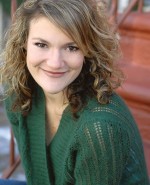Title
Three women who excel at writing exciting plays about seemingly ordinary characters will share the bill with three female directors at the ninth annual fall Playwrights Festival this month. The festival, which takes place September 9 through 12, showcases the work of three of the ongoing playwrights—Chelsea Marcantel, Boo Killebrew, and Mary Elizabeth Hamilton. The plays, excerpts of which appear below, will be performed by the fourth-year actors. Marcantel's Everything Is Wonderful will be directed by Tyne Rafaeli; Lee Sunday Evans will direct Killebrew's Miller, Mississippi; and Portia Krieger will direct Hamilton's One of the Women.
Body
Everything Is Wonderful
When an Amish couple's two sons are killed in a car accident in Chelsea Marcantel's Everything Is Wonderful, they struggle to maintain their faith and cling to their way of life. In an act of pure forgiveness, they welcome Eric, the driver who caused the accident, into their home. But Miri, the wayward daughter who left them, is not so easily forgiven. Her return to this insular community dredges up old secrets and forces her family into a new kind of reckoning.
Eric approaches Miri in the barn.
Miri: (irritated) Do you need something from me?
Eric: No, I just. I just saw you and I thought… we haven't really spoken yet, so…
Miri: Did you think that was an accident?
Eric: You're avoiding me.
Miri: Wouldn't you avoid you?
Eric: I guess. Probably.
Miri: You don't have to pull your sad sack bullshit on me. I'm not one of them and I don't have to pretend to forgive you. Tell me really, truly, what you're doing here. Did you lose your job? Did your folks kick you out? What sick perversion made you decide that your best move right now is to camp out in the family barn of the two people you murdered?
There is a long silence.
Eric: I did lose my job. About a year ago. And my girlfriend kicked me out, right after that. My family… we don't relate because I don't want to be them. They're very upset, and I don't blame them. I've been a real disappointment to myself, too. But I know more than I did when I got here a week ago. I know more about family. About God.
Miri: What has shoveling horse manure with my dad taught you about God?
Eric: A lot.
Miri: You're full of it. You just didn't have anywhere else to go. They're grieving and gullible, and you're sick.
Miller, Mississippi
Boo Killebrew's Miller, Mississippi is a lurid drama set against the backdrop of a civil rights-era Mississippi. As racial progress pummels forward, we witness one family's downward spiral. In this scene, Becky Miller has just confessed to her mother, Mildred, that she does not want to go to her cotillion. John Miller, Becky's younger brother, and Doris Stevenson, the Miller housekeeper, watch as Mildred forces Becky to "grow up."
Mildred: Sweetheart, this is the beginning of the rest of your life. I met your father at my cotillion.
Becky: I don't want to meet anyone.
Mildred: Is that right?
John: Mama, Becky doesn't—
Mildred: So, it's just gonna be me and you in this house for the next 50 years? Just two old hens pecking at each other night and day? Is that what you want?
Becky: No ma'am.
John: Mama, it's just a dance.
Mildred: That is not true. That is simply not true. It's growing up. That's what it is. Growth is the only evidence of life. Isn't that right, Doris? Isn't that what they say?
Doris: What who say?
Mildred: The world! Everyone!
Becky: I'm gone go and do my homework.
Mildred: No homework. We are leaving this house right now.
Becky: Ma'am?
Mildred: We are going to get your hair cut.
John: What?
Mildred: Then we are going to Highland Village and we are buying you some clothes that fit properly. Then we are going to sit in my powder room and you are going to finally let me show you how to put on makeup. Then we are going to have a nice long chat about your self-worth. Then, and only then, may you go to your room to do your homework.
One of the Women
When Caroline discovers her father has been sleeping with prostitutes for the past 40 years, she is compelled to meet all these women for herself. Mary Elizabeth Hamilton's One of the Women follows Caroline as she seeks to find the truth behind her father's past, and in so doing uncovers unexpected truths about herself.
A diner.
Gwynn: You graduated in '98?
Caroline: Yes.
Gwynn: You know Haley Squire?
Caroline: I don't think so.
Gwynn: She played lacrosse.
Caroline: I didn't know a lot of people.
Gwynn: She might not've been a Squire then.
Caroline: I didn't get out much.
Gwynn: She might've been a Perkins.
Caroline: I didn't know her.
Gwynn: Haley Perkins. I think that's right. We used to work together.
Off Caroline's look.
Gwynn: At the diner, we served mozzarella sticks and snuck cigarettes in the ladies. Haley Perkins. She was funny.
Caroline: Maybe I'd know her if I saw her.
Gwynn: You would. She's got these like ears. You'd know her.
Caroline: Do you want another Diet Coke?
Gwynn: Are you getting another Tang?
Caroline: I'm not finished. I might get one when I'm finished.
Gwynn: It rots your teeth, it's like worse than rust, I read a Gawker article about it.
Caroline: Everyone did.
Gwynn: It's sweet though and zero calories so I say fuck it. He came in Tuesdays.
Caroline: I'll get you a Coke.
Gwynn: This is what you want to know, right? Do you want details? I can give them to you. I'm not a fucking doctor, I don't have client confidentiality so if you want details—
Caroline: I don't.
Gwynn: What do you want?
Caroline: To talk.
Gwynn: 'Kay. But that's kinda fucking weird, right? Kinda creepy and weird.
Caroline: I'm paying you.
Gwynn: I might charge more for that. "To talk." I might charge double.







